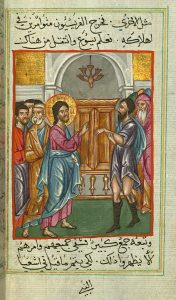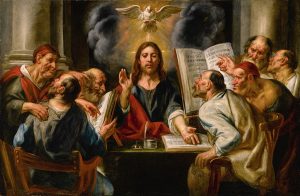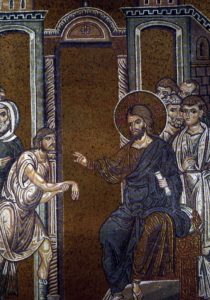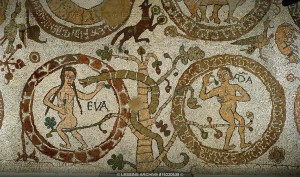Thoughts on Sunday’s Lessons for June 2, 2024 (Pentecost 2B/Proper 4)

Jesus Heals the Man with a Withered Hand (1692), illumination in an Arabic manuscript of the Gospels copied in Egypt by Ilyas Basim Khuri Bazzi Rahib, probably a Coptic monk. (Click image to enlarge.)
First Reading (Track One): 1 Samuel 3:1-10
Our liturgy now moves into the long season after Pentecost. For six months we will walk with Jesus and the apostles, hearing Mark’s Gospel narrative of Jesus’ early ministry from Galilee to Jerusalem and the cross. During this season we have a choice of two “tracks” of Lectionary readings for first reading and the Psalm. Sunday’s first reading for Track One, which we also heard after Epiphany earlier this year, tells us of the young prophet Samuel, puzzled by a mysterious voice that calls him in the night that he eventually discerns as God’s call.
First Reading (Track Two): Deuteronomy 5:12-15
Sunday’s Track Two first reading foreshadows the Gospel with a passage about Sabbath from the First Testament’s “other” Ten Commandments narrative: not the familiar version in Exodus but a somewhat more extended list in Deuteronomy. While the Exodus version tells us to rest on the seventh day because God rested on the seventh day after the creation, this commandment is more nuanced: Because the people were once slaves who never had rest until God brought them out of Egypt, all creatures should rest and give thanks on the Sabbath – all the family, resident aliens, even slaves, and all the family livestock as well.
Psalm (Track One): Psalm 139:1-5, 12-17
We heard this Psalm on the second Sunday after Epiphany. Now we repeat it on the second Sunday after Pentecost. God knows us as intimately as the potter knows his clay, the Psalmist sings. God knows our every thought, whatever we are doing, wherever we are; God knows every word that we speak and every idea that we imagine. Even before we were born, God knew us.
Psalm (Track Two): Psalm 81:1-10
This song of praise and joy to God who led the people out of Egypt imagines an orchestra of ancient instruments ringing out in exultation. Sing with joy, it shouts; raise a song with timbrel, harp, lyre, and ram’s horn to accompany the people’s voices in praise of God who heard the people’s voices and came to save them. Recalling the first commandment, we recall, “There shall be no strange god among you … I am the Lord your God.”
Second Reading: 2 Corinthians 4:5-12
We will spend six weeks hearing passages from Paul’s second letter to the Christian community in Corinth, Greece. This shorter letter – actually several short epistles later combined in a single volume – was written several years after the first, and it follows what Paul calls “a painful” return visit with this beloved but often argumentative community. In this portion (perhaps the last of the letters), that quarrel seems behind them, and Paul offers beautiful words of encouragement for hope after despair and survival after loss. Death may come, as it did to Jesus, but life flourishes in us through the glory of God that makes the life of Jesus visible in our mortality.
Gospel: Mark 2:23-3:6
These two short narratives from early in Mark’s Gospel set a theme that will recur through Mark and through the Gospels: Jesus is not afraid to challenge authority, and Jesus has little patience for rote obedience to the rules – specifically rigid Pharisaical interpretations – when a practical need makes it more sensible to bend or ignore them. So we see Jesus and the disciples picking and eating grain on the Sabbath because they are hungry; then Jesus heals a man with a withered hand in the synagogue, as the Pharisees look on with angry horror and begin plotting ways to destroy him.



